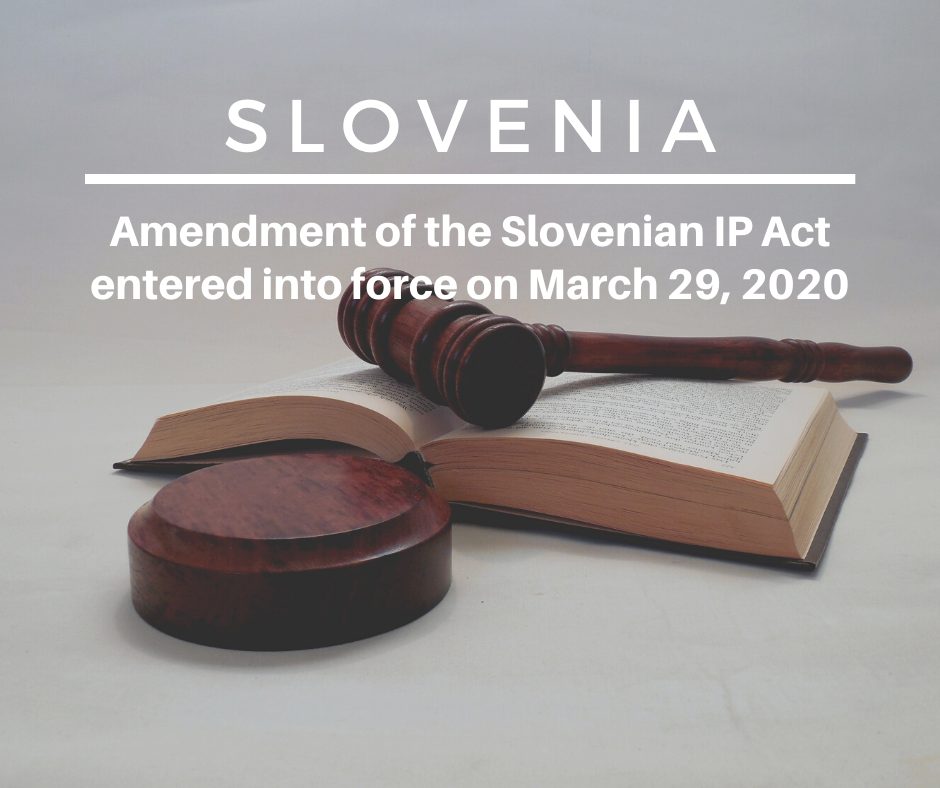On March 29, 2020 the amendment of the Slovenian IP act entered into force in order to implement most of the provisions from the Directive 2015/2436/EU. The most relevant changes are:
- New types of trademarks.
- It is possible to register sound as a trademark, multimedia marks, holograms and other types of trade marks.
- It is not necessary any more for the sign to be graphically represented.
- Absolute grounds for refusal.
- A trademark shall not be refused registration based on the absolute grounds for refusal in case that the mark has acquired a distinctive character before the date of application for registration. For the same reason a mark shall not be declared invalid.
- Relative grounds for refusal.
- The relative grounds include more clear definition regarding the well-known marks as a reason for rejection of the trademark application, all in accordance with Article 6.bis of Paris Convention.
- A trademark applied for is rejected even if the goods or services covered by the application are not identical or similar to those for which the earlier well-known mark was registered.
- Acquiescence.
- The amended Act introduces a preclusion of a declaration of invalidity due to acquiescence.
- Rights conferred by a trade mark (comparative advertising, transition of the goods).
- The holder of the prior mark obtained a new right to prevent all third parties from bringing goods, in the course of trade, into Slovenia or to carry out any customs procedures for such goods, including transit, transshipment, warehousing, free zones, temporary storage, inward processing or temporary importation, including where such goods are not intended for placing on the market in the Member State concerned.
- A collective mark is comprehensively regulated as a mark used by several entities.
- The concept of a collective mark, the rules for use of a collective mark, the conditions for its registration, use, invalidity and annulment are now defined. Collective trade mark provisions are mandatory and must be transposed by all Member States into their national law.
- Use of an International mark.
- The five-year period shall be calculated from the date, when the decision of grant is published in the WIPO bulletin. If Slovenian IPO did not sent the WIPO the notification of the grant of protection in one year period from the date of the WIPO notification of the request for protection and it did not inform the WIPO of the provisional refusal in the same deadline, the period of five years shall start to count from the first day after the expiration of one year from the date of notification of the WIPO of the request for protection.
- Provisions on rights in rem on trade mark.
- A trademark may, independently of the undertaking, be given as security or be the subject of rights in rem.
- A trademark, patent or design may be levied in execution.
- A trademark, patent or design may be licensed for some or all of the goods and/or services for which it is registered. A license may be exclusive or non-exclusive.
- Opposition proceedings.
- In the opposition proceedings the proprietor of the earlier trademark who has given notice of opposition shall, at the request of the applicant, provide the proof that the earlier trademark has been put to genuine use during the five-year period preceding the filing date or date of priority of the later trade mark, or that proper reasons for non-use existed. In the absence of proof to this effect, the opposition shall be rejected.
- The parties shall be granted, at their joint request, a six months period in the opposition proceedings in order to allow for the possibility of an amicable settlement (the so-called cooling-off period) between the opposing party and the applicant.
- Non-use as a type of defence in invalidity proceedings or infringement proceedings.
- In proceedings for a declaration of invalidity / infringement action based on a registered trade mark with an earlier filing date or priority date, if the proprietor of the later trade mark so requests, the proprietor of the earlier trade mark shall furnish proof that, during the five-year period preceding the date of the application for a declaration of invalidity / infringement action, the earlier trade mark has been put to genuine use. In the absence of the proof, an application for a declaration of invalidity / infringement action on the basis of an earlier trademark shall be rejected.
- In addition to the right holder also the beneficiary of the use of the collective mark and the licensee may claim judicial protection.
- Gradual transition to electronic business of the Office.
- The Office is adjusting to a new electronic way of communicating and issuing decisions and other documents electronically. The Office, in cooperation with EUIPO, is implementing a project to replace the existing back office system with a new on-line system.
Most of the applied changes have an immediate effect, however please note that all revocation and invalidation proceedings will remain in the jurisdiction of the District Court in Ljubljana at least until 2023.






